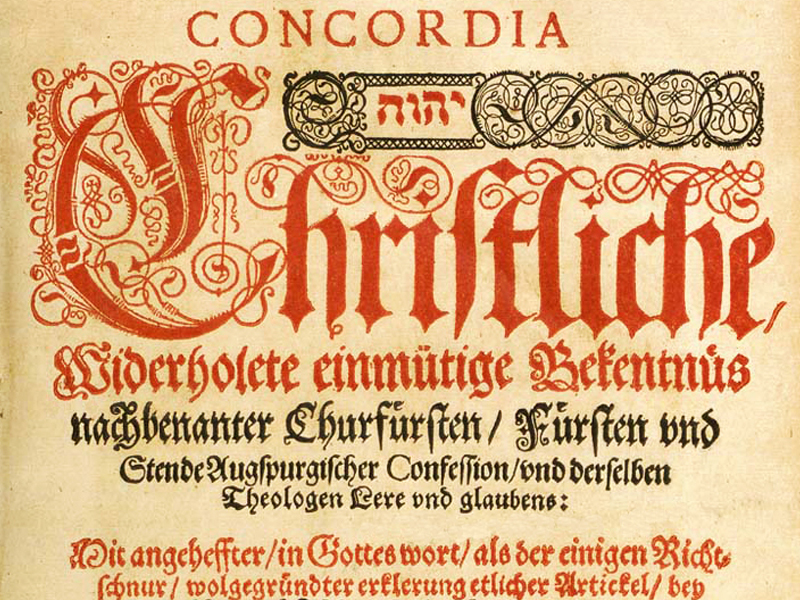by Rev. Mark Bestul
“Adiaphora” – it’s both a loved and “loaded” term these days, isn’t it? It defends from images of strict legalism, while painting images of “every congregation for herself.” The oft-quoted remark of Luther that sinners are like a drunk peasant who falls out of one side of the saddle, then the other side, applies also in this case. Falling from horses can be dangerous, so let’s briefly consider what history and the Confessions have to say about properly handling “adiaphora”.
The term became important in the Reformation first because the Reformers needed to defend against the Roman idea that customs add to salvation, but second because some began to argue that the faithful can change our practices to look and sound like popular opponents of the Gospel without it affecting our doctrine. The Confessions speak against both errors…and keep the drunk peasant propped in the saddle.
On the one hand, the Lutherans were admittedly stunned by Roman ideas that certain traditions must be kept to contribute to salvation: “We supposed that the adversaries would defend human traditions on other grounds. Yet we did not think this would happen, that they would condemn this article: We do not merit the forgiveness of sins or grace by celebrating human traditions.”[i] The obviousness of the error allowed the Lutherans to appeal to the church universal: “Why do we need a long discussion? No tradition was set up by the Holy Fathers for the purpose of meriting the forgiveness of sins, or righteousness.”[ii]
It would seem the need for discussion was closed.
On the other hand, the Confessions themselves admit there’s another side to the discussion: “We are not now discussing whether it is helpful to keep [traditions] because of peace or bodily profit…. The question at hand is whether the observances of human traditions are acts of worship necessary for righteousness before God.”[iii]
So what if the question becomes, “Is tradition helpful?”
Over the years and quite gradually, the definition of adiaphora – “customs that are not necessary unto salvation” – has been casually abbreviated to “customs that are not necessary.” But, the Confessions are careful not to speak that way, lest the drunk peasant fall off the other side of the horse. In fact, the above quote from Apology XV continues, “… Rather, they were instituted for the sake of good order in the Church and for the sake of peace.”[iv] Likewise, Apology VII/VIII both condemns legalism, while upholding the usefulness of customs: “Clearly human traditions do not enliven hearts and are not effects of the Holy Spirit” – but why retain traditions? – they are “love for one’s neighbor, self-control, and so on.”[v] Indeed, repeatedly citing 1 Corinthians 14:40 (“All things should be done decently and in order”) the Lutherans confess, “We cheerfully maintain the old traditions made in the Church for the sake of usefulness and peace” and, again, “Good order is very fitting in the Church, and is for this reason necessary.”[vi] Are traditions necessary unto salvation? No! But because of the need for good order for our brother’s and our sinful flesh’s sake, are traditions necessary? So say the Lutheran Confessions.
Investigating this subject further, what happened in the second generation of Lutheranism? The claim of “Adiaphora!” was improperly used to say that the true faith can be practiced in ways that give an appearance of unity without concern for a gradual change in doctrine (a temptation both in returning to legalism or in copying other worship styles). But the Formula of Concord appealed, “[When] departing from the Gospel’s pure doctrine and true religion should happen or gradually follow from such ceremonies, we cannot regard them as adiaphora.”[vii] Adiaphora may be matters “not necessary unto salvation,” but that does not mean they are wholly indifferent in matters of the faith.
So then, in our day, let’s keep the drunk peasant well-balanced: Christian freedom voluntarily binds itself to serve good order, peace, patience for fellow Christians (and sister congregations!), and the like. We can’t decide adiaphora based on our genuine, heartfelt desire for “conversion” or “missions” because adiaphora do not convert and therefore ought not be added or discarded to attract the unconverted. To do this would be to declare that customs bring salvation and are no longer adiaphora. Instead, the discussion of adiaphora centers on Christian freedom serving good order, peace, confession within our beloved synod and reminding us of our connection to the church of all generations.
Though the term “adiaphora” can sometimes bring heated discussion, the two extremes can be answered with true Lutheran joy. If someone says you must follow tradition, simply ask, “Will it gain me heaven?” That should quiet the legalism. However, if someone says, “Tradition and church custom? – matters of indifference!”, then say, “The Lutheran Confessions and five hundred years of Reformation practice have a bit to say on that.”
The Rev. Mark Bestul is pastor of Calvary Lutheran Church in Elgin, IL.
[i] Apology XV, 3 (citations of the Book of Concord use Concordia: The Lutheran Confessions).
[ii] Apology XV, 13.
[iii] Apology VII and VIII, 34; emphasis added.
[iv] Apology XV, 13-14.
[v] Apology VII and VIII, 36.
[vi] Apology XV, 22.
[vii] Formula of Concord, Solid Declaration X, 5.
